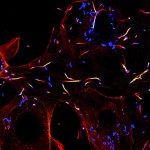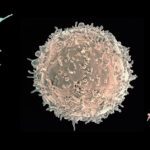Asthma is the most common chronic lung disease, caused in half the cases by exposures to allergens such as mites. Allergic asthma is characterized by eosinophilia and high levels of IgE and type 2 cytokines such as IL-4 and IL-13, and is thus called “type 2-high” asthma. Current treatments include monoclonal antibodies targeting IL-4Rα, the common receptor subunit of IL-4 and IL-13, they but remain expensive and require a long-term prescription. Pierre Bruhns’ team, in collaboration with Laurent Reber from Toulouse Institute for Infectious and Inflammatory Diseases (INFINITy) and the company Neovacs, investigate a new approach based on a conjugate vaccine against both IL-4 and IL-13.
They measured the efficacy of this vaccine on mice knocked-in for human IL-4, human IL-13, and human IL-4Rα genes, and exposed several weeks intranasally to house dust mites to induce allergic asthma. The intramuscular vaccination by the conjugate vaccine reduced peribronchiolar inflammation, mucus production and eosinophilia, as well as IgE production, without significant impact on other immune responses. This study shows that dual vaccination can efficiently protect against key features of asthma in mice knocked-in for several human genes, moving a step closer towards human clinical trials for this new class of treatments against allergic asthma.
Source
A vaccine targeting human IL-4 and IL-13 protects against asthma in humanized mice, Allergy, February 17, 2023
Read the press release: A New Milestone in the Development of an Effective Allergic Asthma Vaccine




